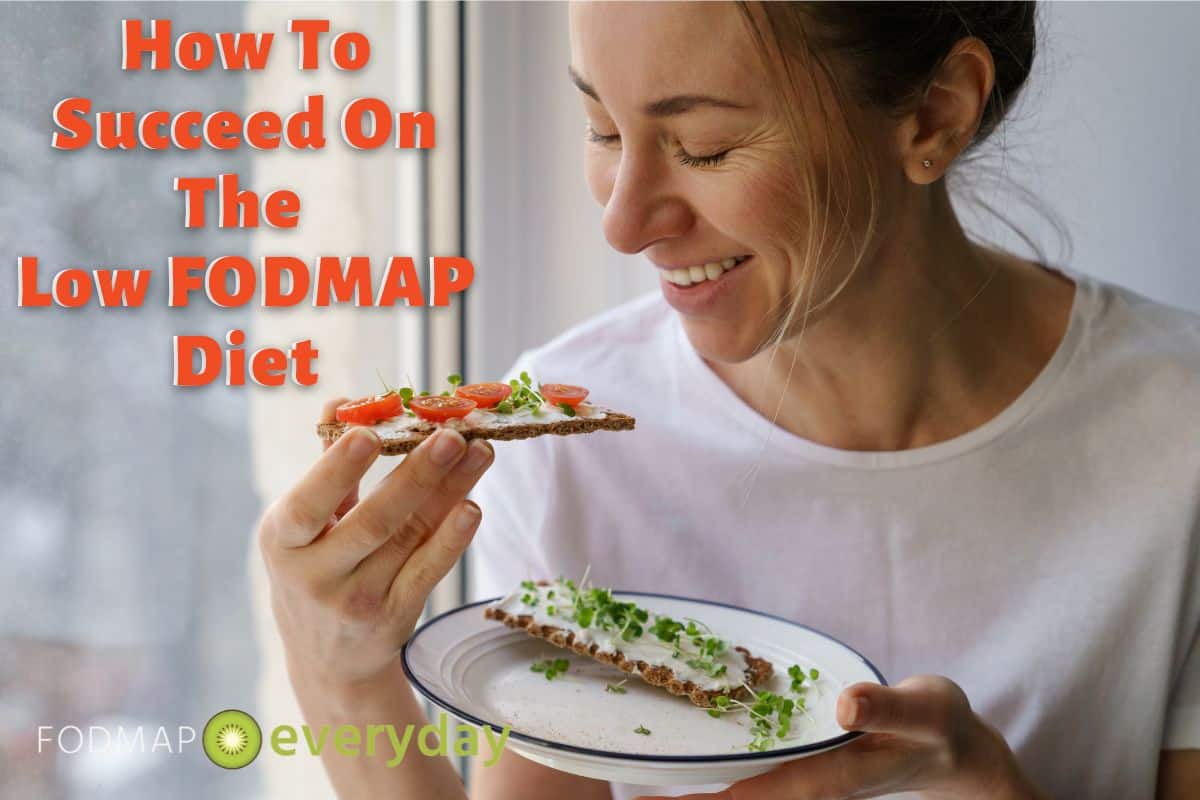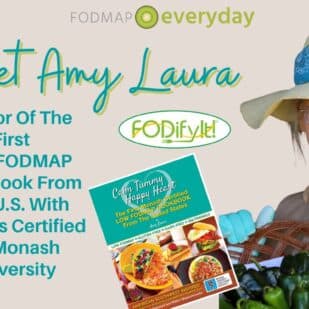Warning: I am not going to mince words in this article. I want you to get better. I have hit rock bottom and know, up close and personal, what it is like to be in so much irritable bowel syndrome (IBS) pain that I wanted to die. I don’t want anyone else to ever have to get to that point. Consider this an opinion piece.

But this is an opinion from someone who has IBS, is following the low FODMAP diet, is Monash University dietitian trained, is Accredited by FODMAP Friendly as a FODMAP educator, and who has been educating about the diet full time for 6 years. I have learned a lot, and see what is occurring within the FODMAP community. These are my observations and thoughts. (PS: my personal IBS story is here.)
How To Succeed On The Low FODMAP Diet
This article contains some strong words about what I believe it takes to get better, from the point of view of someone who has IBS and who has discovered the low FODMAP diet.
This is from the heart. My heart.
Let’s Talk about how to succeed on the low FODMAP diet.
Here We Go…
You have IBS. You want to feel better. You want to be able to eat and not feel like the food you consume has a personal vendetta against you. Sound like you? This was definitely me circa 1990 to 2015.
The low FODMAP diet has been clinically proven to help up to 75% of those diagnosed with irritable bowel syndrome (IBS).
The low FODMAP diet has been clinically proven to help up to 75% of those diagnosed with irritable bowel syndrome (IBS).
But here is the trick – which really isn’t a trick at all. You have to follow the diet to know if it is going to work for you. And it has complexity and nuances, which are best worked through with a Registered Dietitian (RD) who has been trained specifically about the diet. Our strong suggestion is to work with a dietitian who has completed Monash University training for the low FODMAP diet.
Here’s why.
The Same Issues Crop Up Again And Again

We hear from many of you through our site as well as social media, and we have also been part of many Facebook Groups, which have tens of thousands of members.
And we see the same issues again and again.
- Folks are having trouble with the diet.
- They have questions about the diet.
- They are still experiencing pain.
- They don’t understand why certain symptoms are happening and they are frustrated, discouraged and just plain exasperated.
The 3 Reasons The Diet Isn’t Working…
Here’s the good news. There is a common thread. It comes down to just THREE things. We consistently see that people:
- Are not working with a FODMAP trained registered dietitian.
- Are not using accurate resources.
- People aren’t actually following the diet. (More on this below).
Three Steps To Being Symptom Free?

Imagine if you could get ahold of your symptoms with just three changes? Imagine living pain and symptom free – finally!
- Work with a FODMAP savvy RD. And it is easier than ever. More and more will meet remotely, via telehealth. AND we see this route ending up being MORE economical than if you spend months, even years, spinning your wheels.
- Know your resources! Monash University and FODMAP Friendly are the only two primary sources that are doing original research and publishing the results publicly. Get their apps. Now. No excuses.
- Listen to your RD. You want to follow the diet in the best way that is tailored to YOUR needs. Not everyone’s approach will be (or should be) the same.
Common FODMAP Mistakes
Remember when we said, “You have to follow the diet”?
- If you are making diet choices based upon inaccurate and/or outdated research, you are not following the diet.
- If you are approaching the diet yourself and picking and only choosing the parts you understand, or the parts that are easy for you, you are not following the diet.
- If you are relying on crowdsourcing answers from social media platforms as your main means of information, then you are not following the low FODMAP diet.
- If someone (even a GI!) has given you a handout that is inaccurate or contains only partial information, that will not help you follow the diet. (Believe it or not the low FODMAP PDF food list from Stanford University that is floating around online contains a lot of incorrect information).
- If you are overlaying other restrictive protocols (without a RDs supervision) such as keto, paleo, raw, low sugar, vegan, low carb, Whole30, no nightshades – the list could go on – then you are not following the low FODMAP diet as it was originally intended. We know that many of you have medical issues and conditions in addition to IBS and might need a broader approach. BUT, for this to be successful, for you to find relief, you have a much, much, MUCH higher chance of success if you are working with a RD who can make specific recommendations and track your progress.
- Did you download a free smartphone app because you were trying to save money? Do you know where the information came from? Even if it has a Red Light/Green Light system, if it isn’t the Monash University Low FODMAP Diet Smartphone App, or the FODMAP Friendly App, you very well might not be following the diet, because you are using incorrect information.
Frustrated? Me Too
Okay, I know I sound harsh and like I am wagging my finger at you, and I am, but it is with love.
I want everyone who might be helped by this diet (and it is probably 75% of you!) to get his or her best shot. And the reality is that there are very clear ways to follow the Elimination Phase and the Challenge Phase and they are best conducted with a FODMAP trained registered dietitian.
Registered Dietitians Can Help Tailor The Diet To You

The low FODMAP diet has some very clear boundaries and approaches – but one size does not fit all. There are stricter ways to approach the diet and there are ways that are less restrictive, such as The Gentle Approach.
If the diet is recommended for a child or teenager, there are different considerations than if it is being applied to an adult. Your RD will assess what is best for you after a full medical intake.
They can help you one-on-one AND help guide you in finding accurate and helpful resources to use on your own.
Know Your Resources

So, if you are feeling frustrated, if you are not getting the results you had hoped for, take a look at the possible whys.
Who is guiding you in this journey? Where did you get the information that you are basing your decisions on?
Just because a recipe on-line says it is low FODMAP doesn’t mean that it is. We see recipes like this all the time!
Just because a recipe on-line says it is low FODMAP doesn’t mean that it is.
Just because someone calls themselves a “health coach” or “nutritionist” doesn’t mean they have the knowledge or education needed to guide you. (Check out our article about Dietitians vs. Nutritionists).
Just because you read a thread on a social media platform relating to this diet doesn’t mean that the information is true.
Take a step back to digest all of this (yes, I said digest).
We know that engaging with a RD is usually an out-of-pocket expense. We also know that if you don’t have your health, that your life is negatively impacted in every way.
And, we know that if you take some time to vet your resources, that you can find those that will truly help you.
Monash University To The Rescue
Hopefully by now you know that researchers at Monash University developed the diet and that we use their science-based information to develop our recipes are articles. We’ve got great news for you! They have created a Patient’s Course that you can take in the comfort of your own home!
Please read our article, Monash University Low FODMAP Patient Course: Overview & Review for a more complete description.
Basically, for $29.99 you can learn everything you need to know about the diet, from the folks who developed the diet. It has 5 modules that take you step-by-step through the 3 parts of the diet.
We highly recommend that you take the course as an adjunct to working with a RD. It will help you immensely. There is even a FREE PREVIEW! There is no reason not to check it out!
FODMAP Everyday® Is Here To Help

Let’s end on an up note! You can do this. There are tools available to you to help you succeed. And by succeed, we mean get you to a place where you are not in pain, you can eat again, and have a positive relationship with food.
The ideas laid out in this article are what we have seen work. Time and again.
Our Success Team is made up of FODMAP savvy RDs, most of them Monash University trained. Our Test Kitchen is overseen by a Monash trained professional developer, who is also FODMAP Friendly Accredited. The FODMAP Everyday® brand is FODMAP Friendly Accredited as well.
We will always work very hard at bringing you the most accurate, reliable, interesting and delicious low FODMAP information available ANYWHERE! That is our promise to you.
We will show you how to THRIVE on the low FODMAP diet. We are thrilled that you are here as part of our community!
Our Best Reference Articles
Here are some of our most helpful and popular articles to get your started:
- IBS: Step-by-Step Guide from Diagnosis to Symptom Free Living
- The Role Of The Dietitian vs. The Gastroenterologist
- Have IBS? Top Reasons To Work With A Dietitian
- IBS Subtypes: Your Specific Type of Irritable Bowel Syndrome Will Determine Treatment
- Timing of Digestive Symptoms
- FODMAP Everyday® Global Registered Dietitian Directory
- How To Choose A Dietitian
- Dietitians & Nutritionists: What’s The Difference?
- Patient Dos And Don’ts For A Great Telehealth Appointment
- What If The Low FODMAP Diet Isn’t Working?







